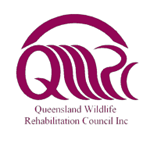
Queensland Wildlife Rehabilitation Council
Living With Wildlife In Your Backyard
- Be a responsible pet guardian. Dogs and cats cause injury and death to many of our wildlife species. Supervise them at all times and keep dogs and cats inside at night.
- Teach your children to love, respect and appreciate wildlife and the environment.
- Use environmentally friendly detergents and cleaning agents. Restrict use of pesticides, fungicides, and herbicides on your land. Wildlife can be poisoned by these chemicals.
- Retain and plant native vegetation on your land. Plants provide food, shelter, nesting sites and safe passage for wildlife. Hollows in trees are also very important.
- To prevent accidental drowning in ponds and pools attach a thick rope securely outside the pool and put the other end of the rope in the water to help animals climb out.
- Observe wildlife from a distance. Animals can easily become distressed and injure themselves if they feel threatened.
- Do not feed native wildlife but plant food trees for them. If you must feed them only feed small amounts, of natural diet, on an irregular basis from a distance. Supply fresh water in the form of a bird bath or frog pond.
- Drive slowly and carefully, especially at dusk, night and dawn.
- If you accidentally injure or encounter an injured animal please stop to offer assistance if it is safe to do so.
- Ensure your own safety whenever dealing with any wildlife situation including highways, trees and water courses.
- Never relocate an animal out of its natural area.
- Consider if the animal really needs to be rescued before you try to offer assistance.
- Don’t attempt any rescue unless you feel comfortable to do so.
- Carry an animal rescue kit in a box in your car including a blanket, towel, pillowcase, scissors and a safety pin.
- Always check the pouch of dead marsupials as you remove them from the road. The pouch is where a belly button would be.
QWRC has, in good faith, given directions for the assistance of sick, injured or orphaned native wildlife but incurs no liability for the actions taken or decisions made.
For further information on individual species, refer to the Department of Environment and Heritage Protection website here
Your local group may have members who like to care for wildlife and those who support the efforts of the group by offering any skills they have.
- Can you help your local group to help our wildlife?
- Could you, with appropriate training, man a rescue telephone?
- Could you make cages or help build aviaries?
- Could you help to make bags to house small marsupials?
- Could you help to raise food for animals in care?
- Could you, with appropriate training, babysit an animal for a couple of hours or days?
- Could you help to raise funds by selling raffle tickets?
- Could you assist with the collection and delivery of animals or food supplies?
The list of tasks that could help your local group is almost endless.
Please contact your local group to discuss with them what assistance you may be able to offer.

